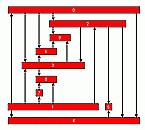Example Visibility Representation
|
Let The following program shows how |
|
|
We first generate a random planar graph Then we define |
|
|
Using these parameters we call We use |
|
#include <LEDA/graph/graph.h>
#include <LEDA/graph/node_array.h>
#include <LEDA/graph/graph_draw.h>
#include <LEDA/graphics/graphwin.h>
using namespace leda;
int main()
{
graph G;
random_planar_graph(G,10,20);
node_array<double> xpos(G), ypos(G);
node_array<double> xrad(G), yrad(G);
edge_array<double> xsanch(G), ysanch(G);
edge_array<double> xtanch(G), ytanch(G);
bool feasible=
VISIBILITY_REPRESENTATION(G,xpos,ypos,xrad,yrad,xsanch,ysanch,xtanch,ytanch);
if (feasible) {
GraphWin gw(G);
gw.set_node_shape(rectangle_node);
gw.set_node_color(red);
edge_array<list<double> > xbends(G), ybends(G);
double dx,dy,f;
gw.fill_win_params(xpos,ypos,xrad,yrad,xbends,ybends,dx,dy,f,f);
gw.transform_layout(xpos,ypos,xrad,yrad,xbends,ybends,dx,dy,f,f);
gw.set_layout(xpos,ypos,xrad,yrad,xbends,ybends,
xsanch,ysanch,xtanch,ytanch);
gw.open(); gw.display();
}
return 0;
}
See also:
Manual Entries:
